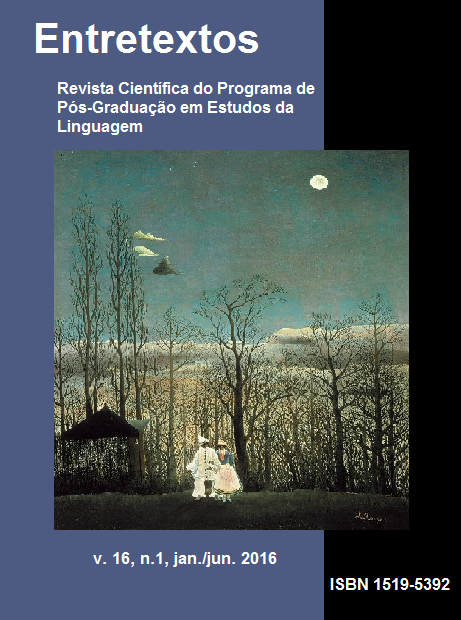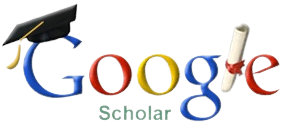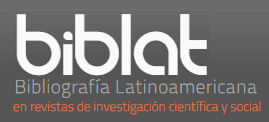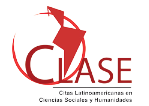(Re)thinking foreign language teaching and learning
DOI:
https://doi.org/10.5433/1519-5392.2016v16n1p25Keywords:
Education, Teaching and learning, Foreign languageAbstract
Education fulfills a social function. Thus, on the threshold of a pragmatic, dynamic, volatile century, the school, as well as the teaching, is replaced by new social demands. About this issue, so that the characters have a concrete engagement in the social world, it is not only necessary language skills development both in the vernacular language and in a foreign one. In view of this, this paper referred to the research effort to the main contributions of a specialized and epistemological foundation about the prospects of the teaching and learning of foreign languages. About the methodological nature of the paper, the research was exploratory as to the objectives and literature research in relation to sources of information, based on the technique of indirect documentation, the main procedure of data collection. The data were analyzed qualitatively in a critical and reflective perspective which revealed intriguing implications. First, the relevance of learning, mastery, competence and linguistic--discursive commitment in a foreign language at the threshold of an era in which international relations, techno-scientific progress and globalization are intensified. Second, the factors that (do not) enable the effective teaching and learning process of foreign languages. Thus, inferring, there are educational gaps and paradigms. Therefore, the teaching and learning process of foreign languages is flawed. One of the first steps to reverse this scenario is to understand the language as an essentially oral phenomenon, the heterogeneity of students, and the role in learning. Finally, having the pedagogical practice consolidated in the applicability, utility, real meaning of the content and activities for learning students, and, significantly, in the playfulness.References
BRASIL. Ministério da Educação e do Desporto. Secretaria de Educação Fundamental. Parâmetros Curriculares Nacionais: terceiro e quarto ciclos do ensino fundamental: língua estrangeira. Brasília, 1998.
CANALE, Michael; SWAIN, Merrill. Theoretical bases of communicative approaches to second language teaching and testing. Applied Linguistics, Oxford, v. 1, n. 1, p. 1-47, 1980.
CHOMSKY, Noam. Aspects of the Theory of Syntax. Cambridge: The MIT Press, 1965.
DIAS, Reinildes. Língua Estrangeira: Ensinos Fundamental e Médio. 2005. Disponível em: http://www.filologia.org.br/ileel/artigos/artigo_068.pdf. Acesso em: 25 dez. 2015.
KRASHEN, Stephen. Second Language Acquisition and Second Language Learning. New York: Pergamon, 1981.
LUQUE, A.; VILLA, I. Aquisição da linguagem. In: COLL, C.; PALÁCIOS, J.; MARCHESI, A. (Org.). Desenvolvimento psicológico e educação. Porto Alegre: Artes Médicas, 1995.
OXFORD, Rebecca. Language learning strategies: what every teacher should know. Massachusetts: Heinle Publishers, 1990.
PIAGET, Jean. A psicologia da criança. Rio de Janeiro: Bertrand, 1998.
SANTA CATARINA. Secretaria de Estado da Educação e do Desporto. Proposta Curricular de Santa Catarina: educação infantil, ensino fundamental e médio: Disciplinas curriculares. Florianópolis: COGEN, 1998.
SCARAMUCCI, Matilde Virginia Ricardi. Proficiência em LE: considerações terminológicas e conceituais. Trabalhos em Linguística Aplicada, Campinas, v. 36, 2000. Disponível em: http://cedae.iel.unicamp.br/revista/index.php/tla/. Acesso em: 12 dez. 2015.
SCHÜTZ, Ricardo. O aprendizado de línguas. Rio de Janeiro, 2009. 35 diapositivos.
SCHÜTZ, Ricardo. O que é talento para línguas? 2004. Disponível em: http://www.english.sk.com.br/sk-talen.html. Acesso em: 28 nov. 2015.
VIGOTSKY, Lev Semenovitch. A formação do símbolo na criança: imitação, jogo e sonho imagem e representação. Rio de Janeiro: LTC, 1990.
VYGOTSKY, Lev Semenovitch. A formação social da mente. São Paulo: Martins Fontes, 1989.
VYGOTSKY, Lev Semenovitch. Pensamento e linguagem. São Paulo: Martins Fontes, 1987.
WALLON, Henri. A evolução psicológica da criança. São Paulo: Martins Fontes, 2007.
Downloads
Published
How to Cite
Issue
Section
License
Entretextos adota a Licença Creative Commons Attribution 4.0 International, portanto, os direitos autorais relativos aos artigos publicados são do(s) autor (es), que cedem à Entretextos o direito de exclusividade de primeira publicação.
Sob essa licença é possível: Compartilhar - copiar e redistribuir o material em qualquer suporte ou formato. Adaptar - remixar, transformar, e criar a partir do material, atribuindo o devido crédito e prover um link para a licença e indicar se mudanças foram feitas.




















